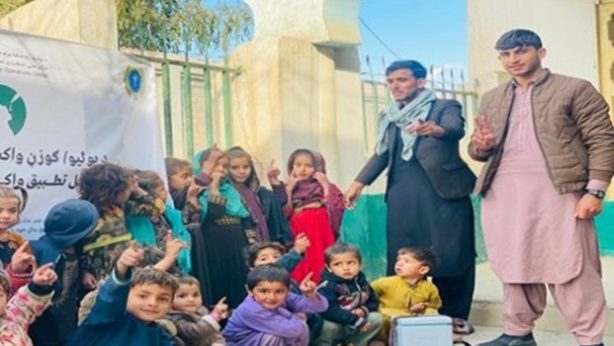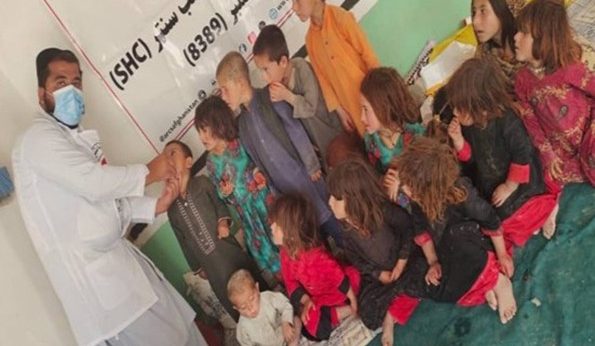Tribal Leaders: Strong Support behind Polio Vaccine Campaigns

Zabul, Afghanistan – The tribal leaders of Zabul play a pivotal role in expanding the coverage and ensuring the success of polio vaccination campaigns across the province.
By leveraging their strong community ties, they not only combat misconceptions related to the polio vaccine but also encourage families to vaccinate their children, thereby protecting them from the dangers of polio.
As a result of their efforts, polio vaccination campaign coverage has increased in remote areas, leading to a positive shift in public perception.
The Role of Tribal Leaders
Haji Abdul Mateen, Khan Mohammad, and Haji Samiullah are among the tribal leaders in the province who are respected and trusted by the people.
Haji Abdul Mateen, a tribal leader from the Shahjoy district, says: “Our people often fall prey to rumors about vaccines. When negative talk about the vaccine arises, they become skeptical and refrain from vaccinating their children. However, it is our duty to provide them with accurate and reliable information and convince them to vaccinate their children against polio.”
He believes that, by using their influence and trust, community leaders can dispel rumors and misconceptions, thus changing public perceptions.
He has personally convinced over 50 families in his district to vaccinate their children on time and bring all children under five years of age to the village mosque for vaccination during the campaigns.
Khan Mohammad is another tribal leader who says he has been fighting against polio for years.
“We took on this important task because there was a lack of public awareness in the area. Often, in regions with limited healthcare services, people fall victim to misinformation about vaccines. They think that vaccines are dangerous for children, but it is our duty to provide them with accurate information and reassure them that the polio vaccine is safe, Halal, and the only means of protection against polio,” he explains.
Similarly, another tribal leader named Haji Samiullah, says: ” We discuss the importance of vaccines for all childhood diseases, including polio, during mosques, community meetings and even weddings. We emphasize that polio has no cure and that vaccination is the only way to prevent it.”
According to him, as responsible members of the community, it is their duty to encourage people to prioritize their children’s health.
“Initially, in some remote areas, people were skeptical about the vaccine, but when we vaccinated our own children and they saw that there were no negative effects, they were willing to vaccinate their children as well,” Haji Samiullah adds.
 As a result of the tribal leaders’ efforts, polio vaccination campaign coverage has increased in remote areas, leading to a positive shift in public perception within the community © Polio Free Afghanistan/2024/ Saeed Zabuli
As a result of the tribal leaders’ efforts, polio vaccination campaign coverage has increased in remote areas, leading to a positive shift in public perception within the community © Polio Free Afghanistan/2024/ Saeed Zabuli
The Results of Tribal Elders’ Efforts
In Zabul, the efforts of tribal elders have proven effective in the success of polio vaccination campaigns.
Local residents say that the support of these elders has not only expanded the coverage of polio vaccination campaigns but also played a positive role in changing public perceptions within the community.
Abdul Haleem, a resident of Shinkay District, cites himself as an example of someone convinced to vaccinate his children as a result of the tribal elders’ efforts.
He says, “Initially, I was skeptical about the polio vaccine. I had heard that the vaccine could harm children, but when Haji Khan Mohammad provided us with accurate information about it, my perspective changed.”
He adds that the guidance of tribal elders have reassured many people like him that the vaccine is safe and the only way to protect their children from the paralyzing disease of polio.
Polio is a viral illness that enters the human body through the poliovirus and, by damaging the nervous system, paralyzes the body.
While the disease can affect individuals of any age, its primary victims are children, who, in severe cases, can become permanently paralyzed or even die.
The only way to prevent polio is through vaccination, and while many countries around the world have made significant progress in this regard, children in some regions remain deprived of this life-saving vaccine due to misconceptions and misinformation.
There are extensive campaigns to eradicate polio in Afghanistan. However, the role of tribal elders in this effort holds particular importance, as their involvement helps persuade families to vaccinate their children and protect them from this dangerous disease.
By Saeed Zabuli, Polio Free Afghanistan


